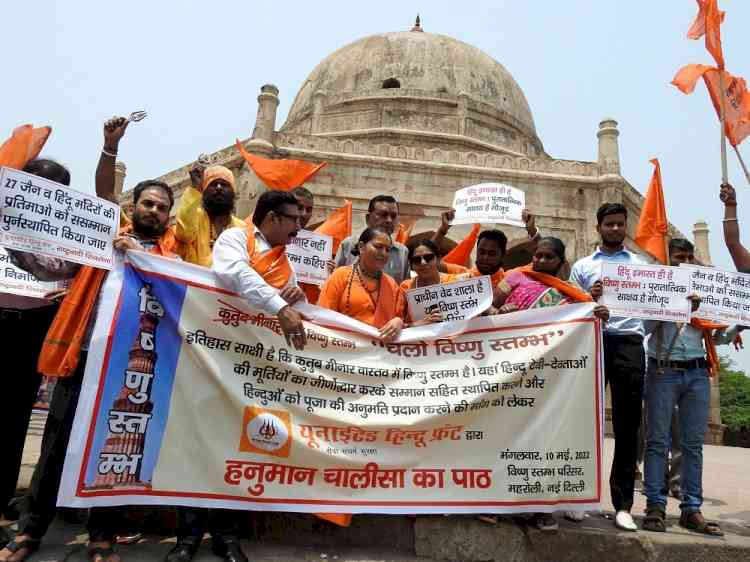Rename Qutab Minar as Vishnu Stambh, allow us to immerse broken idols: United Hindu Front
There was a heavy police deployment outside the Qutab Minar complex in the national capital on Tuesday after a right wing group gave a call to recite 'Hanuman Chalisa' on the premises of the world heritage site.

New Delhi, May 10 (IANS) There was a heavy police deployment outside the Qutab Minar complex in the national capital on Tuesday after a right wing group gave a call to recite 'Hanuman Chalisa' on the premises of the world heritage site.
The origin of Qutab Minar is shrouded in controversy. Some believe it was erected as a tower of victory to signify the beginning of the Muslim rule in India. Others say it served as a minaret to the muezzins to call the faithful to prayer.
United Hindu Front (UHF) president Jai Bhagwan Goyal, who had given a call to reach the complex at 12.00 p.m. on Tuesday, while exclusively speaking to IANS, said that he has been under house arrest since morning at his residence in Delhi's Shahdara area. "At least 10-15 police personnel are outside my house. They are not allowing me to leave,"the UHF president said.
Several people affiliated with right wing groups had gathered outside the Qutab Minar even as there was heavy police deployment. They were seen reciting the Hanuman Chalisa (a Hindu religion prayer).
"First stop calling it a Qutab Minar. When Qutab-ud-din Aibak came to India, he demolished Hindu and Jain temples and started calling it Qutab Minar. This is not Qutab Minar, it is Vishnu Stambh. Its name should be immediately changed," Goyal demanded.
He further said that several Hindu idols are still present inside the complex and many of them are broken, which is proof that a temple was demolished there. "At least allow us to immerse those idols which are broken and lying inside the complex," said Goyal.
He further demanded that those idols, which are not broken, should be installed there and people should be allowed to visit and pray.
According to Delhi Tourism, Qutab Minar is a soaring, 73 m-high tower of victory, built in 1193 by Qutab-ud-din Aibak immediately after the defeat of Delhi's last Hindu kingdom. The tower has five distinct storeys, each marked by a projecting balcony and tapers from a 15 m diameter at the base to just 2.5 m at the top.


 IANS
IANS 








